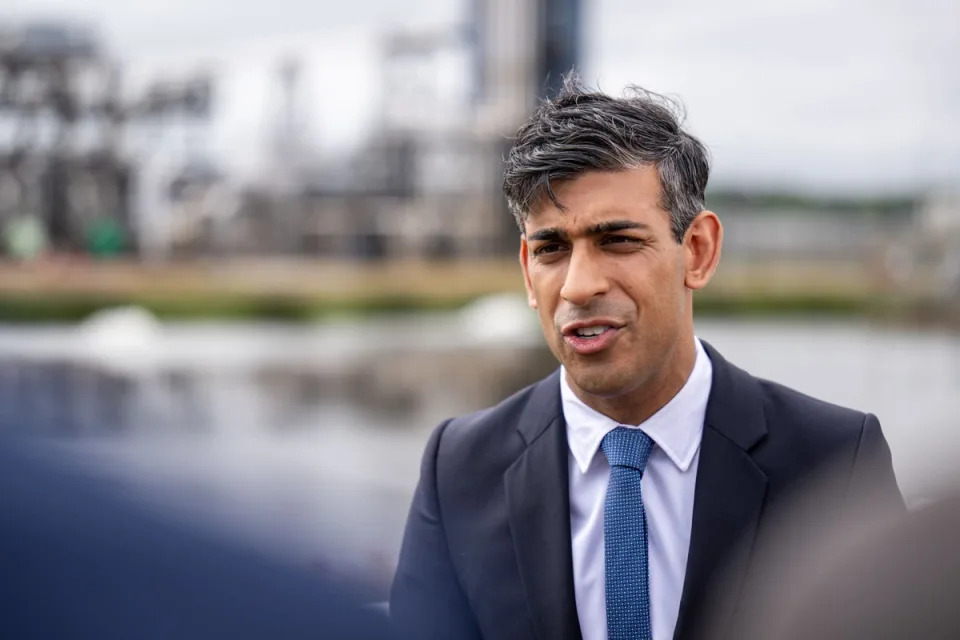Adam Forrest
Sun, 13 August 2023

Rishi Sunak’s government has distanced itself from the idea of a “Lavatory Tsar” after it was mocked for its new public toilets strategy.
Mr Sunak and his equalities minister Kemi Badenoch were ridiculed following a report that the government was planning to introduce a toilets commissioner to address the closure of public toilets.
But it is understood that the plan is not being considered. Although it was discussed in parliament after being raised by a Labour MP, it was rejected by the government amid fears that it would increase bureaucracy.
It came as the government weighed into a fresh “culture war” row over bathrooms, announcing plans to crack down on gender-neutral toilets. New shops, public buildings and offices will be ordered to provide single-sex facilities, as the PM and Ms Badenoch engaged in a “war on woke” row with transgender rights groups on the issue.
Launching her new crackdown, the equalities minister said that the widespread switch to gender-neutral toilets had removed the “fundamental right” of women and girls to “privacy, dignity and safety”.
Trans rights groups have argued that gender-neutral toilets can help to combat discrimination, since trans people can face difficulties using male or female toilets.
But the Sunak government argues that communal cubicles and hand-washing facilities have led to “dignity and privacy concerns” among women who feel “unfairly disadvantaged”.
Pledging to halt the increasing use of gender-neutral facilities, the government is changing regulations to specify that all new non-residential buildings must offer separate single-sex toilets for women and men.
Self-contained, private unisex toilets should be provided in new buildings if there is space – but should not be put in at the expense of single-sex toilets.
“It is important that everybody has privacy and dignity when using public facilities,” said Ms Badenoch. “Yet the move towards ‘gender-neutral’ toilets has removed this fundamental right for women and girls.”

Sign for a non-binary gender neutral toilet (PA)
There was confusion over a report in The Sunday Telegraph which claimed that ministers planned to appoint a Lavatories Tsar.
Labour’s mayor of Newham Council compared it to John Major’s much-mocked “cones hotline” fiasco in the early 1990s, when the then Tory PM was ridiculed for his focus on minor traffic issues during a major economic recession.
But the government later made clear that it had no plans to bring in a tsar, pointing out that it had rejected a Labour amendment to the Levelling Up and Regeneration Bill in October to have a commissioner for public loos.
However, some on social media questioned the government’s sense of priorities for focusing on bathroom rows during a cost of living crisis.
One Twitter user said voters “can’t pay our rent, mortgages, fuel bills, or buy food” while ministers were tackling the issue of “sex-segregated lavatories”.

Rishi Sunak has been accused of ‘ugly culture war’ (PA Wire)
And Tory MP Caroline Nokes defended the use of gender-neutral toilets. “What matters most when it comes to toilets is design,” the equalities select committee chair told Pink News.
“I always point at Portcullis House in parliament, which has bathrooms on every floor. Nobody refers to them as gender-neutral bathrooms – they are just bathrooms.”
The government has previously been accused of using gender-neutral toilets and other trans-related issues to stoke divisions in a “war on wokeism”.
Labour’s Wes Streeting, the shadow health secretary, told The Independent in June that Mr Sunak was exploiting the trans debate as a “wedge issue in an ugly culture war”.
The PM was also accused of transphobia after a leaked video saw him mocking Ed Davey for “trying to convince everybody that women clearly had penises”. But No 10 insisted the joke was at the expense of the Lib Dem leader, not of a minority group.
It comes as the government prepares to set out new guidance to schools on trans issues when parliament returns next month.
The delayed document is widely expected to tell headteachers to consult parents if their child talks about a desire to transition socially to a different gender.










